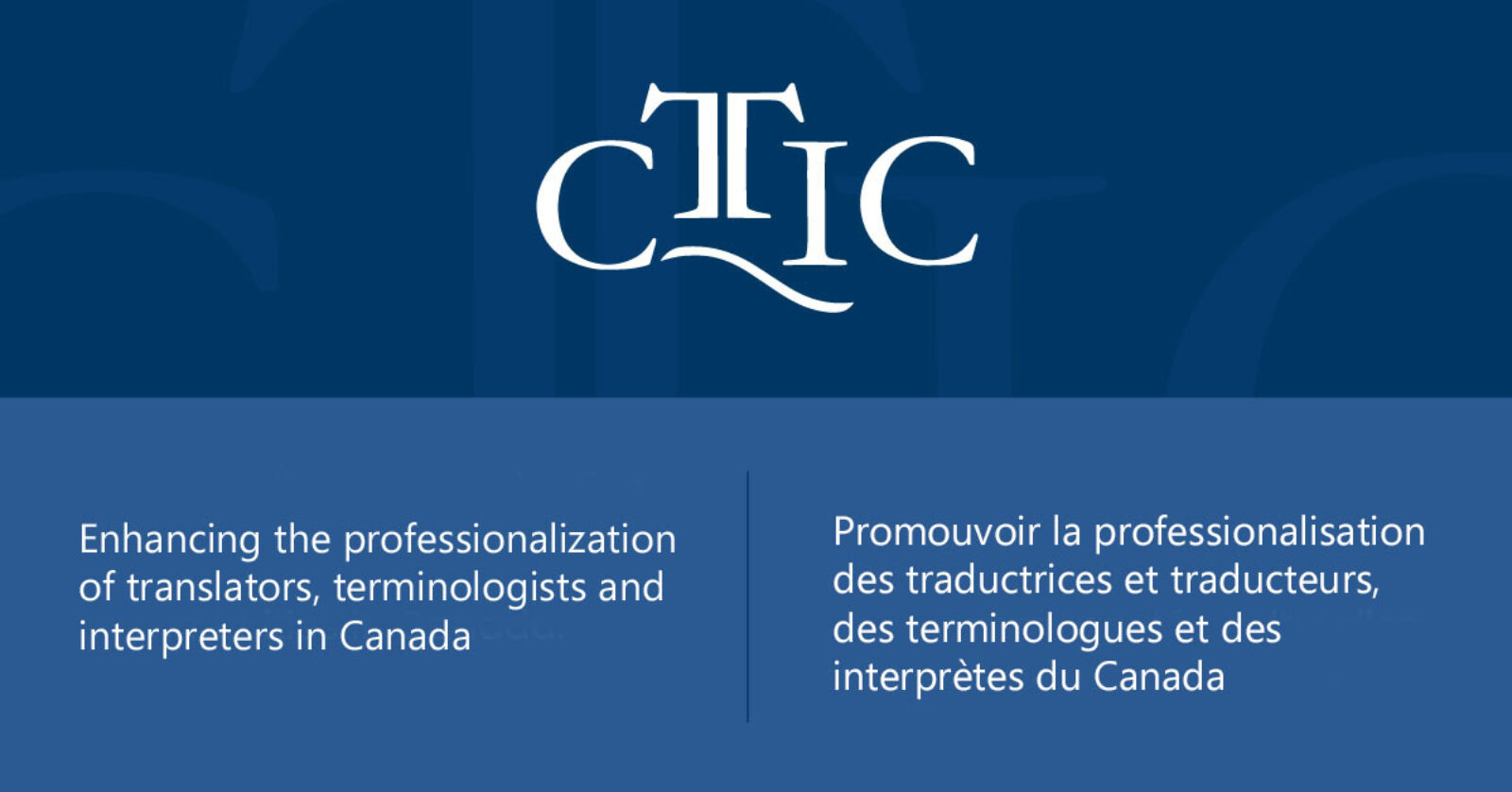An interview with Angela Fairbank, CTTIC Member-at-Large 2022-2023, August 22, 2023.

(c) Hélène Bilodeau
Translator, Terminologist, Interpreter – which of these three professions do you identify with?
Translator.
Please provide a brief synopsis of your education – including language education – and background related to how you came to be a Translator, Interpreter or Terminologist. For example, immersion in foreign countries and culture, university education, mentorship/menteeship, internship, etc.
As a francophone growing up in Quebec City, I started learning English in grade 5 and it came naturally to me. After graduating from high school, I registered in Administration at the local CÉGEP (Collège d’enseignement general et professionnel, or General and professional teaching college). I was good at Math, but found it was taught at too fast a pace for me, so I switched to the Arts, where I learned Spanish and German. Representatives from the Glendon College (York University) Translation Program came one day to recruit students. I took their test and was told I had the skills to become a translator. I applied and was accepted but didn’t go right away because I wasn’t ready either financially or emotionally. Instead, I worked as a waitress to earn money to pay for my studies, and took courses for a year in Russian, German and History at Université Laval. It was finally then that I felt ready for Glendon College and three years later I graduated with an honours B.A. in Translation. While I was studying there, I worked as a French monitor at two primary schools. At the end of my last year as a monitor, the school’s Principal offered me a job as a teacher, but sadly I had to turn him down since I was studying to become a translator. Nevertheless, I thought seriously about his offer and decided to enrol in a 2-year program at the University of Toronto to become a teacher. However, that summer, due to my father’s serious health issues, I was unable to do the degree. After my father died, I went to work in Toronto as a translator for Toyota. My next job was at Mattel, the maker of Barbie dolls! I was there during Barbie’s 30th anniversary!
I started freelancing after my 1st child was born and got into literary translation by translating the 5th and final book of a historical fiction series, The Key to Zion, by Boddie Thoen. The translator who had translated the first four books became ill so the publisher asked me. I had already translated over 300 Sunday school lessons for them. I also translated a non-fiction book on burn-out. I was freelancing at the time although life had meanwhile intervened along with marriage and children. I had three children altogether. After the youngest child turned three, we moved to Winnipeg since my husband was offered a job teaching at the university here and after a month, I began working with the provincial government – at the Legislative Translation branch. I was filling in for someone on sick leave so the job wasn’t permanent. Then another branch recruited me for a permanent track position, so I went there. Due to the way the work was organized, I was given a bit of everything to do, so it was a steep learning curve and because of the way I am wired, I found it difficult to translate as quickly as they wanted me to. In my mind, it wasn’t the best way to train people. Moreover, at the time, one of my children was having some serious health issues, so my mind was more on them than on my work.

Hélène with Mattel’s Barbie in 1989 when Barbie turned 30.
I was diagnosed with ADHD only recently, which means I went through most of my life not knowing why I wasn’t able to keep jobs very long. I lacked tact and tended to do things differently from others. I was also unable to understand what was expected of me, unable to read people as well as others did, or to express myself in a way people would expect. I found people too sensitive. I didn’t have a good filter. When I work with a client, I feel my purpose is to make them look good. If the source text is incorrect, I will point it out. Sometimes excellent work takes too long. I require trust from my clients. I sometimes lose clients because I’m too brutally honest.
I also once worked at a software company (EISI Emerging Information Systems Inc.) where I was hired as a translator to clean up the Help section of one of their software programs and ended up becoming a proofreader, and mentored two translators: one Quebecker and the other a Franco-Manitoban. It was a really good experience.
A few years later, I was asked to write a course called “Traduction pour paralangagiers” offered by Université de Saint-Boniface (USB), in association with Collège Communautaire du Nouveau-Brunswick (CCNB), Collège Lionel-Groulx (Sainte-Thérèse, Quebec) and Cité Collégiale (Ottawa, Ontario) as part of a “Services paralangagiers” program. After I wrote the course with the help of two experts at the USB, I was asked to teach it online. It was a fulfilling experience. After that, I worked as a Communications Officer for Manitoba’s French Schools Division, then as a French language coach on the movie Jack, a biopic about NDP leader Jack Layton. More recently, I studied toward a degree in High School Education. I had a minor in French and had to get one in English as well. Unfortunately, the structure was too rigid – I like to wing it when I teach. Moreover, the practicum I was assigned was time-consuming. It took me a total of 3 hours by bus, 4 days a week, to get there and back.
Are you currently working in-house or as a freelancer? If you have had experience in both types of employment, which do you prefer?
I currently work as a freelancer. I prefer freelancing because of my personal situation and personality but I believe everyone should start and train in-house before becoming a freelancer.
Where do you currently exercise your profession?
At my home office in Winnipeg, Manitoba.
Are you certified in your profession? If so, by which certification organization(s), and for how long have you been certified now? If you are certified, once you became certified, did you notice your income increase slightly, moderately or substantially?
Yes, I became a certified English to French Translator via a CTTIC exam through ATIM (Association of Translators and Interpreters of Manitoba) in 2001. At the time, my certification changed absolutely nothing because I was already employed. But later in my career, it certainly helped to have the credentials because some jobs are only available to certified translators – such as work with the provincial and federal governments.
What have been some of the highlights of your career so far?
Two highlights come to mind: 1. When I worked for Mattel and, had I not had a kid, I’d probably still be working there. (I was a single mother at the time and found it overwhelming, so I left.) As a result of my work with Mattel, I participated in the Nintendo Challenge. I was trained to be Mattel’s French PR for the duration of the Challenge. We went on tour, in a trailer lined with computers that played Super Mario Bros. Kids would come and play in an attempt to win the Challenge. It was a national competition that stretched from British Columbia to Newfoundland. Because I was bilingual, I traveled East with the team, from Ontario to St John’s. 2. When I worked as the French coach for Rick Roberts, an actor from Ontario, who played NDP leader Jack Layton in the 2013 film for CBC television called Jack. It was filmed here in Winnipeg over a couple of months.
Have there been any particular challenges in your profession you would like to share with our readers?
My personal challenge has been having ADHD and never being aware of it. Had I known much earlier on in my life, I could have adjusted. My difficulties had always been explained away as “hormonal problems.” We all have our strengths and weaknesses. I was told by one of my colleagues at ATIM, who was also part of the team who hired me to work for the Provincial Government, “I’ve never seen anyone who can translate quite like you.” I have often observed that when people are exceptionally good at some things, they are also exceptionally bad at others.
What advice do you have for colleagues who are just starting – or thinking of starting – today?
Always follow your instincts. Double check everything. If the French translation of a word, a term or an expression sounds English, it probably is. Look at it again and find the correct French equivalent. Don’t take chances. Take your time. Don’t promise to deliver earlier than realistically possible. Instead, to do a great job, take the time you need. Also don’t assume anything about anyone. Learn to know your co-workers. Don’t make assumptions about them. All people are different. Learn about those differences and how to appreciate them.
I understand you served in the past as Vice President of ATIM (Association of Translators and Interpreters of Manitoba) for about five years. You became a new board member of CTTIC in 2022 and you also volunteer as the CTTIC exam coordinator for ATIM. What challenges have you had to face in this new role?
My challenge has been learning how everything works. There are now new ways of taking the CTTIC certification exams. In the past, a candidate for certification simply wrote the exam using a pen on paper. A few years ago, a new system was introduced whereby they could write the exam using a laptop. Most recently, it has been possible to write exams online. That is new for me. Moreover, I have had to learn about CTTIC’s interpreting exams as I am not an interpreter. I also find it difficult to set aside the necessary time to look after this new role. The most frustrating thing perhaps is not having the answers to all the questions candidates ask me. I have to ask other people and wait for the answers. Furthermore, no one really introduced me to the role of provincial exam coordinator. ATIM has had 5 people in this role over the last five years so there’s been a rapid turnover and different management styles. Lots of balls have been dropped, unfortunately, and there’s quite a bit of catching up to do.
What made you decide to join the CTTIC board this year? Has joining the board helped you and ATIM at all?
I joined because I thought I might be able to bring a new aspect to the board because of the different way I am wired. By being on the board, I have learned how other provinces operate. It has opened my eyes to the variety of ways problems can be solved. I can be a more productive member of my own association because I now work with colleagues in different provinces. I am amazed at how well-rounded and productive other provincial bodies have become and how efficiently they represent and serve their members. I don’t believe ATIM is quite there yet. I think being at the next AGM in person will allow us to achieve a great deal more than we can on Zoom. It is difficult to have meaningful discussions via Zoom.
Is there anything I have missed that you would like to add?
I really like working on my own as a freelancer. It is truly liberating. I can do other things at the same time, such as laundry, as I work out how words, phrases or sentences should be translated. I can choose my own hours: I can work at night if I so choose and then sleep in. But I will reiterate that I believe it is worthwhile and necessary to get training in-house first before becoming a freelancer.
